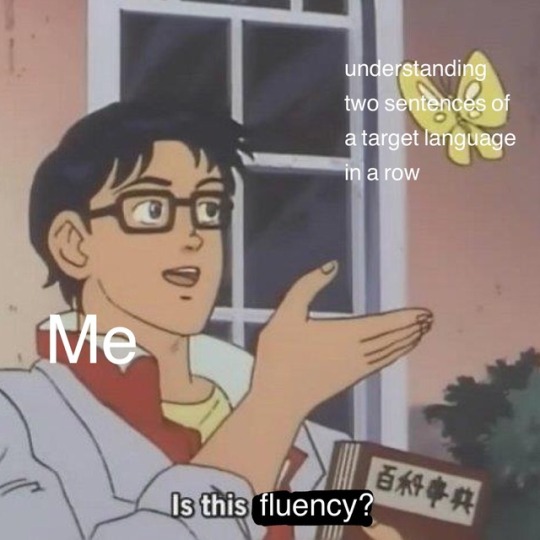Malena - 21 - Arg - Native spanish speaker - (English) - learning German :-) Just a Language Enthusiast REQUEST A VOCAB LIST FOR SPANISH!
Don't wanna be here? Send us removal request.
Text
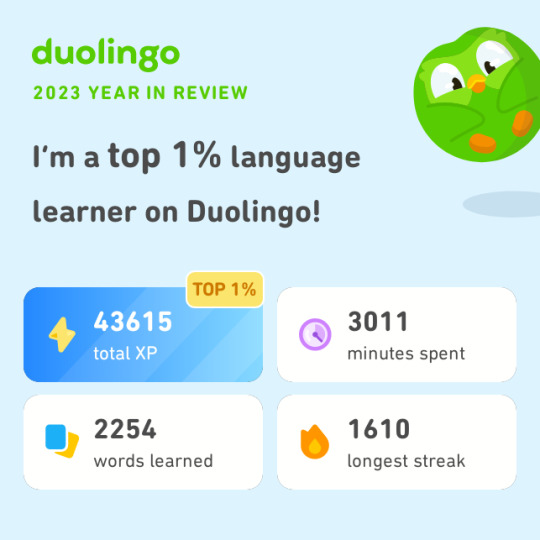
Lmao look
#yes i will desapear for ages and just show up to share duo wrapped#studyblr#langblr#language learning#language#tongueblr
18 notes
·
View notes
Photo
I always love seeing your log!!
I've been trying to make something similar for my blog 🥰
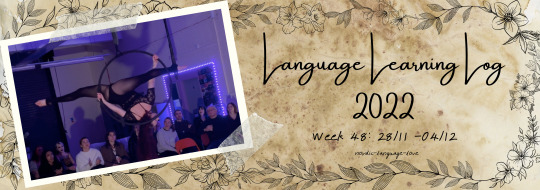
Language Learning Log 2022 Week Forty-Eight (28/11 - 04/12)
Banner photo: On Saturday we held our first ever studio showcase, and I performed my first ever aerial hoop routine. This is one of my favourite tricks from my routine! I’m still absolutely bursting with pride over how the whole thing went!
Norwegian
1x italki lesson
Duolingo
Speaking practice
Read Tante Ulrik’s Vei
Japanese
1x italki lesson (45m)
Renshuu (daily)
Read 1x short story

I had SUCH a good progress moment with Japanese this week! I have this book of bilingual short stories for beginners, and on Sunday I decided to try reading one without looking at the English translation. And I understood so much of it! There were a few words I didn’t know, but where I didn’t understand full sentences I understood the main idea.
Other than that, my week’s been pretty busy. We had our studio showcase on Saturday (which went AMAZINGLY btw!) so any time not spent teaching English I’ve spent at the studio. Other than Friday, that is. On Friday I had to go down to London for my visa appointment. I could’ve spent my journey studying, but I mostly just listened to music and chilled out (did do a little bit of messing around on apps and reading my book though) - I even managed to doze for about 15 minutes, and I really struggle to sleep on public transport! I’m not mad about it or anything; I clearly needed to spend some time thinking about nothing and letting myself switch off. Annoyingly I have to go back against this week to actually get my visa… very frustrating that I have to spend 7h 20m on a bus, 25m on a tram, 1 hour walking and 2 hours just waiting around for a 2-minute appointment. But it’ll be worth it when I finally get to Japan!
This week will be less busy, but I still have plenty to do. I have a lot of housework (laundry) to catch up on, English lessons to teach, and of course I have to go to London again. So, we’ll see if I can slot some language time in there too!
15 notes
·
View notes
Text
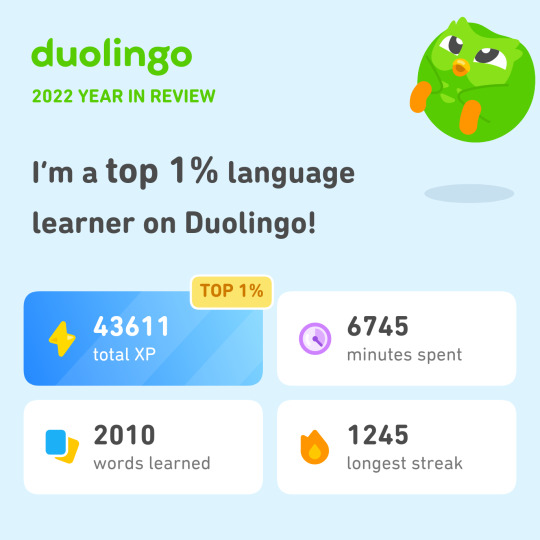
Duolingo Wrapped ok, ok, let's go
#if anyone is on duolingo share your numbers#duolingo#studyblr#langblr#language learning#tongueblr#language#german#learning languages#korean#languages
5 notes
·
View notes
Text
Want to learn something new in 2022??
Absolute beginner adult ballet series (fabulous beginning teacher)
40 piano lessons for beginners (some of the best explanations for piano I’ve ever seen)
Excellent basic crochet video series
Basic knitting (probably the best how to knit video out there)
Pre-Free Figure Skate Levels A-D guides and practice activities (each video builds up with exercises to the actual moves!)
How to draw character faces video (very funny, surprisingly instructive?)
Another drawing character faces video
Literally my favorite art pose hack
Tutorial of how to make a whole ass Stardew Valley esque farming game in Gamemaker Studios 2??
Introduction to flying small aircrafts
French/Dutch/Fishtail braiding
Playing the guitar for beginners (well paced and excellent instructor)
Playing the violin for beginners (really good practical tips mixed in)
Color theory in digital art (not of the children’s hospital variety)
Retake classes you hated but now there’s zero stakes:
Calculus 1 (full semester class)
Learn basic statistics (free textbook)
Introduction to college physics (free textbook)
Introduction to accounting (free textbook)
Learn a language:
Ancient Greek
Latin
Spanish
German
Japanese (grammar guide) (for dummies)
French
Russian (pretty good cyrillic guide!)
336K notes
·
View notes
Text
Coming back to this profile is always so random because it reminds me that:
I haven't been here in so long
I'm not doing the progress I wish I was doing
I was way too into The Witcher for someone who never really bothered to actually watch the show like why are all my recommended post about Them, like-
#also im starting korean but with friends now <3#studyblr#langblr#language learning#tongueblr#language#german#korean#learning languages
2 notes
·
View notes
Text
Kind of back on my bullshit.
Anyone still here ??
9 notes
·
View notes
Text
Mutual Intelligibility: Directory of all posts
This post was originally published on the Mutual Intelligibility mailing list.
Mutual Intelligibility has been a year-long project to curate online linguistics resources. As teaching and learning shifted rapidly to internet-based mediums in early 2020, we wanted to help guide instructors and learners through some of the amazing linguistics content that’s already freely available online.
Below is a full collection of all of the posts that featured on Mutual Intelligibility. Our thanks to everyone who created the resources that we featured, to Liz McCullough for her editorial work, and to the Lingthusiasm patrons who helped us fund this project.
We currently do not have plans to continue with regular Mutual Intelligibility newsletters, but we will keep these existing posts publically available and you can keep an eye out for the occasional future email as we have relevant plans to share. For a more regular correspondence, you can get a monthly email when there’s a new Lingthusiasm episode (including supplementary links on that topic), by signing up at lingthusiasm.substack.com.
Crash Course
To accompany the 16 weeks of 10-12 minute introductory videos on Crash Course Linguistics, we created a newsletter with supporting resources and related activity/activities, curated by Liz McCullough. The activities are mostly from the International Linguistics Olympiad and various national olympiads, which are a huge treasure trove of linguistics puzzle sets.
Week 0 - Preview
Week 1 - Introduction
Week 2 - Morphology
Week 3 - Morphosyntax
Week 4 - Syntax
Week 5 - Semantics
Week 6 - Pragmatics
Week 7 - Sociolinguistics
Week 8 - Phonetics, Consonants
Week 9 - Phonetics, Vowels
Week 10 - Phonology
Week 11 - Psycholinguistics
Week 12 - Language acquisition
Week 13 - Historical linguistics and language change
Week 14 - Languages around the world
Week 15 - Computational linguistics
Week 16 - Writing systems
Resource Guides
These six Resource Guides provide a comprehensive lesson plan (like a textbook’s supplementary material but entirely online), and were compiled with the assistance of Kate Whitcomb. They are also available in PDF and Doc format.
Introduction to IPA Consonants - Resource Guide 1
Introduction to IPA Vowels - Resource Guide 2
Introduction to Morphology - Resource Guide 3
Introduction to Constituency - Resource Guide 4
Introduction to World Englishes - Resource Guide 5
Introduction to Linguistic Diversity - Resource Guide 6
3 Links Posts
3 Links posts are quick highlights lists of three relevant links about a specific topic, with a short description for each of the three resources. We produced twenty-three 3 Links posts in 2020, most of which were edited by Liz McCullough, with other contributors noted on the posts themselves.
3 Links about Linguistics Teaching
3 Links for Second Year Syntax Videos
3 Links for Second Year Phonology
3 Links for Natural Language Processing
3 Links for Semantics and Pragmatics
3 Links for Sociolinguistics
3 Links for Second Year Psycholinguistics
3 Links for Field Methods
3 Links for Articulatory Phonetics
3 Links for Writing Systems
3 Links for Gesture Studies
3 Links for Linguistics Communication (lingcomm)
3 Links for Evidentiality
3 Links for Linguistic Discrimination
3 Links for Linguistics Careers Outside Academia
3 Links for Schwa
3 Links for the Linguistics of Emoji
3 Links for Proto-Indo-European
3 Links for Second Language Acquisition
3 Links for Zero Morphemes
3 Links for Internet Linguistics
3 Links for Language Revitalization
3 Links for Online Teaching
Thanks to everyone who has been following us and sending in questions and links over the past year. It’s been our privilege to help make a rough year somewhat easier for you.
Lauren, Gretchen, Liz, and the rest of the Mutual Intelligibility team
About Mutual Intelligibility
Mutual Intelligibility is a project to connect linguistics instructors with online resources, especially as so much teaching is shifting quickly online due to current events. It’s produced by Lauren Gawne and Gretchen McCulloch, with the support of our patrons on Lingthusiasm. Our editor is Liz McCullough.
Mutual Intelligibility posts will always remain available free, but if you have a stable income and find that they’re reducing your stress and saving you time, we’re able to fund these because of the Lingthusiasm Patreon and your contributions there.
If you have other comments, suggestions, or ideas of ways to help, please email [email protected].
297 notes
·
View notes
Text
German films/TV Recommendation Time
okay Leute, here are some quality German things I can personally recommend:
1. Goodbye, Lenin! (2003). dir. Wolfgang Becker. This film is a classic. I have never met anyone who disliked this film. Basically, a lady falls into a coma before the Berlin Wall falls, and wakes up afterwards in a reunified Germany. Her kids think she won’t live very long, so they try to pretend nothing has happened- and it quickly spirals out of control. There are so many themes touched on in this movie–serious themes–but explored in a fun, comical, interesting way. Also features young Daniel Brühl, 10/10.
2. Das Leben der Anderen (2006). dir. von Donnersmarck. This is honestly one of my favorite films of all time, but as a warning, it’s quite serious. The ending is nice, at least, but this is not a “oh east germany can be kinda funny!” movie, like the previous one. Essentially, a STASI officer starts to develop empathy and see the world differently while listening in on the conversations of a subversive playwright. Visually this film is beautiful and the character development is fascinating – it really illustrates the terror and the distrust that existed at that time, a theme I feel like many people outside of Germany are unaware of.
3. Lola Rennt (1998). dir. Tykwer. This is a cult classic, and if you watch a trailer online, it doesn’t really do it justice. This movie basically explores various “what-ifs” and how small things (like tripping down the stairs) can completely change the outcome of a story. It’s very fast-paced and fun–this is a good movie to watch with friends. There’s less Existential Angst™ than in the majority of German cinema.
4. Der Himmel über Berlin (1987). dir. Wenders. Okay, this is 100% what comes to mind when I think of “pretentious European art film.” However, it is also incredibly beautiful and well-written, and if you like poetry and/or the Cold War and/or are interested in film composition, please watch this movie. Essentially, two angels watch normal people in their day-to-day life, and reflect on some Big Thoughts™.
5. Die Welle (2008). dir. Gansel. This is a movie that unfortunately will never stop being relevant. In fact, I wish this was part of the curriculum in high schools. This film is loosely based on real-life events, where a high-school teacher conducts an experiment to see just how quickly people can, essentially, turn towards fascism, violence, and an extremely “tribal” (or “group” ?)-based way of thinking. The experiment spirals out of control, to a tragic end.
6. Der Staat gegen Fritz Bauer (2015). dir. Kraume. I loved this movie. This is about a lawyer who wants to track down Eichmann (the Nazi war criminal) and bring him to Germany for trial. This is an excellent film because it deals with so many issues– the problem of former Nazis and Nazi sympathizers in government jobs (as well as the corporate world) who obstruct justice; it deals with homophobia and gender identity issues; as well as issues regarding bravery, and “staying alive” vs. “standing up for what’s right.” Having a gay Jewish protagonist in a German film that takes place in the 1950s/60s is really quite amazing, I recommend this heartily.
7. Sophie Scholl: die letzten Tage (2005). dir. Rothemund. This is maybe the only real “WW2 film” I think I’m going to recommend. Frankly everyone should know the story of the Scholls and their heroic actions.
8. Barbara (2012). dir. Petzold. This is a very dramatic and romantic movie with a strong female lead. This also takes place in East Germany, where a doctor is banished to the countryside and is forced to see things in a different light. This is more of a date night movie in my opinion.
9. Gegen die Wand (2004) & Auf der anderen Seite (2007). dir. Fatih Akīn. These are both movies that deal specifically with the German-Turkish experience. To me, these movies felt very Turkish, and are quite good - so if you are interested in learning about what is probably Germany’s biggest minority group, I would start with these.
10. Jenseits der Stille (1996). dir. Link. This is a very cute and touching movie about a (hearing) girl who has two deaf parents. She eventually decides to pursue a career in music, which her parents don’t understand. This deals a lot with identity issues (i.e., there being a distinct “deaf culture”), growing up, and family.
11. Freier Fall (2013). dir. Lacant. WELL, this was (to me, anyway) not exactly a masterpiece but it was a very enjoyable gay film. If you want to see Max Riemelt tenderly kissing another man, and/or fantasize about getting it on with one of your “Straight™” friends, then this is the movie for you. And frankly, who doesn’t want that, from time to time.
12. Romeos (2011). dir. Bernardi. I love this movie because there’s literally nothing else like it. There is an incredible dearth of media that features transsexual men, and this film found a way to do it that wasn’t offensive or patronizing. And to specifically address that you can be trans and gay–that gender identity and sexual orientation are not the same–wow! I’ve never seen that discussion anywhere else (except maybe in sense8, but I digress). The only thing I could criticize this movie for is that it’s a very “transition-oriented” film–the main character does not have much of a personality outside of transitioning. However, for what it shows and for what it is trying to do, it does it very well–the scenes are heartfelt and relatable, and the protagonist is very believable.
**These next few are television series.
1. Deutschland 83 (2015). If you haven’t seen this series yet, what are you doing. This is the most popular and interesting German television series that’s happened in a while. Essentially, a guy from East Germany gets recruited as a spy to live in the West… and a lot of espionage and great ‘80s music occur. It deals with some serious themes, but at the same time, it’s attractive because it has light-hearted moments and a lot of heart.
2. Der gleiche Himmel (2017). This has a very similar premise to Deutschland 83–another “east german spy” series. However, I think selling it as a Deutschland 83 rip-off for Netflix would be unfair–the series has merits of its own, and is much more serious in tone. While Deutschland 83 at times runs into “Goodbye-Lenin-joke-territory,” Der gleiche Himmel does not let you forget the dark side of reality. I enjoyed that this series let you see several different people’s lives, instead of focusing on just the spy–among them, a girl with Olympic aspirations who was given steroids by her coach (and suffered side effects re: male puberty), and a gay physics teacher whose lover was on the other side of the border, and was cut off from.
3. Dark (2017). If you like Stranger Things (or Xfiles)–you need to watch this right now. Personally I liked it better than Stranger Things (though I might be biased). It has a similar starting premise–the mysterious vanishing of a young boy. However, this series is so… German. We start off with a quotation from Albert Einstein, and rapidly get into an intricate, time-traveling mess. You could watch this several times and notice something new each time.
Alright, that’s all I can think of for right now– feel free to add your own! viel Glück!
1K notes
·
View notes
Text
loooove that when you learn a language every word has a much more specific meaning and a memory tied to it. so fun to be reading and understand while simultaneously getting to think of a friend teaching you or learning it from a different book or finding it out while visiting somewhere….words hit different in your target language
222 notes
·
View notes
Note
hello! apologies if you’ve been asked this before, but which apps do you use? :0
Hello! Don't worry at all, I'm glad to help ^^
I daily use Lingodeer and Quizlet to make the flashcards (review them and take notes with examples of the words that are the hardest to remember).


I heard that Lingodeer is mostly paid now, I have no idea cause I have the acc since years ago back when it was basically all free. I recommend you to try it anyway cause it's really good. If you can't do much without paying, I have checked these apps and I think they are pretty good (I don't use them right now cause I don't wanna overwhelm myself with apps since I wanna establish a simple routine, so when I finish with lingodeer I will move to one of these for sure).


Then I use Naver dictionary and Papago to look up for words and translations. They are pretty great and by far the most useful ones, but of course be careful with using the translations since they can sound weird lol


Then as a passive way to learn, I listen to music and read the lyrics, and watch videos on YouTube from native speakers like vlogs or makeup or cooking, and also I watch videos on Vlive (or Weverse if you stan any of the groups available there) which can be useful if you stan some kpop group and they upload content there. In the case of the videos, I usually watch them with eng subs, but now I'm working on re-watching videos without subs so my brain can "guess" what's going on by actually paying attention to the Korea instead of just looking at the subs and be lazy lol.
Also I use Dongsa to check verbs conjugation when making sentences to make sure I won't mess up, Babo to check the grammar of a sentence, and Rieul to type numbers in Korean to be sure how to write them down (I mess them up a lot so lol).



For vocabulary and grammar I'm currently using my textbooks (Learn Korean with BTS - I've posted notes about them here - and Korean Grammar In Use), but you can also use the Sejong Institute apps in their different levels and Avocards for vocabulary flashcards sort by level.
And if you want to check websites for classes you can check Talk To Me In Korean and How To Study Korean. And of course this blog or many others in Tumblr ^^
I hope any of this was helpful! If you have any other doubt, make sure to tell me
Happy learning!

68 notes
·
View notes
Text
[joe biden getting dressed] uhhh honey? where are my shoelaces
26K notes
·
View notes
Text
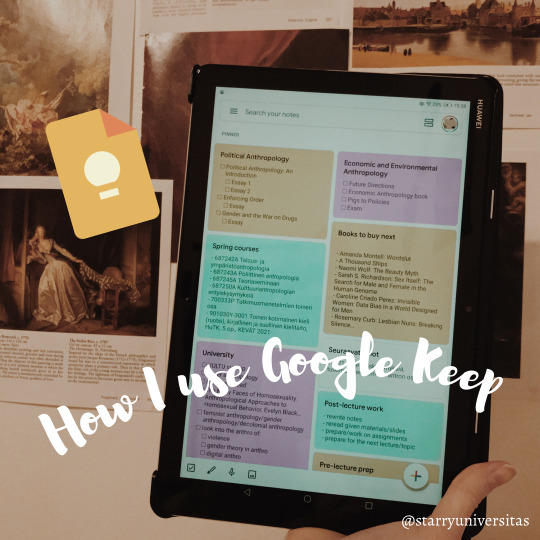
— 28.1.2021 💡 studygram
In addition to Notion I find that Google Keep is a really useful tool for organizing my life and studies!! I especially like its synchronization between devices because I don’t use all android or all apple products so this helps a lot. You can also use it next to Google Calendar for easier planning
I use it as a kind of a brain dump/digital post it note, where I create a note when I have something I need to remember that I will expand later
—> stuff you can do:
- regular text notes
- tickboxes for to do lists
- handwritten notes
- images
- voice notes
- set alarms for any note
Examples of notes I have are books I want to read, subject specific to-do lists, google calendar color coding key, reading journal and studygram/studyblr ideas
146 notes
·
View notes
Text
dropbox containing linguistics textbooks
contains 34 textbooks including etymology, language acquisition, morphology, phonetics/phonology, psycholinguistics, sociolinguistics, & translation studies
dropbox containing language textbooks
contains 86 language textbooks including ASL, Arabic, (Mandarin) Chinese, Croatian, Czech, Danish, Dutch, Estonian, Farsi, French, German, Greek, Hebrew (Modern & Ancient), Hindi, Hungarian, Icelandic, Italian, Japanese, Korean, Latin, Lithuanian, Norwegian, Polish, Portuguese, Punjabi, Romanian, Russian, Serbian, Slovene, Spanish, Swahili, Swedish, Tagalog, Thai, Turkish, Urdu, Vietnamese, Welsh
dropbox containing books about language learning
includes fluent forever by gabriel wyner, how to learn any language by barry farber, polyglot by kató lomb
if there’s a problem with any of the textbooks or if you want to request materials for a specific language feel free to message me!
32K notes
·
View notes
Note
Hi mam ! I'm saher from india. Actually I'm interested in learning Mandarin Chinese and Korean but I don't have much financial support and I don't know where to start? can you please help me that how can I learn Chinese basics to advance by myself how to read and write as well. Can you recommend some books please let me know..
Hi Saher! Lucky for you it’s very easy to learn Chinese online without paying a cent. I hope I can help you find some resources through this list!
First, here’s my masterpost of resources to learn Chinese with.
And over here is a video I made on how to get started learning Chinese.
Here’s a video on how I learn Chinese vocabulary.
Some tips:
1. Decide on whether you want to learn simplified or traditional Chinese.
2. Choose one or two good resources to stick to, like ChinesePod101, Lingodeer App, Pandarow or HSKOnline app etc. Don’t overwhelm yourself with too many apps at once. Usually these are structured quite well for beginners. (Don’t use Duolingo for Chinese!!)
3. Start with the basics - how to introduce yourself and write the basic characters. Try not to feel overwhelmed by all the Hanzi (Chinese characters) but take it slow, maybe do 5 characters at once. You can either learn the characters for new vocabulary from your app or online PDF, or you can download something like 100 most common Chinese characters and do a few a day. Practice writing it over and over so your hand gets used to it.
4. Get a good dictionary app like Pleco and look up all the words you don’t know and save them in a list. You can add them into flashcards either on paper or on an app like Quizlet and review them a lot.
5. Listen to Chinese a LOT. Chinese music, radio, podcasts, TV, talk shows, anything. Even if you don’t understand it, you’ll keep hearing it around you and it’ll help you get used to the sounds of the language.
6. In terms of books, my resource list link at the top has some PDFs, but there are 3 textbooks I used:
- New Practical Chinese Reader (comprehensive for beginners to intermediate)
- Living Language Mandarin Chinese (pretty good and nice textbook layout but too expensive for the limited amount of info they teach you. It moved at a slow pace for me and ‘advanced’ was not really what I would consider advanced, but it’s good for people who want to take it slow and who need audio to follow along with. The audio is good!)
- Berlitz Basic Mandarin Chinese (I’m a visual and auditory learner so I loved this book as a beginner. Lots of pictures and good audio which I listened to in the car a lot. It’s good for newbies!)
I hope this helps.
Good luck!
341 notes
·
View notes
Text
So I’m just going to give a small reading list with links for languages in Africa, because apparently it’s “hard” to find introductory resources even if they’re niche. So:
• “The Languages and Linguistics of Africa” (2018); Güldemann ed.
• “Beyond ‘Khoisan’: Historical Relations in the Kalahari Basin” (2014); Güldemann & Fehn ed.
• “ The Bantu Languages (Second Edition)” (2019); Van de Velde, Bostoen, Nurse, & Philippson ed.
• “Egyptian-Coptic Linguistics in Typological Perspective” (2015); Grossman, Haspelmath, & Richter
• “Dotawo: Journal of Nubian Studies (vol. 1)” (2014); Jakobi, Ruffini, & van Gerven Oei ed.
• “Negotiating and Contesting Identities in Linguistic Landscapes” (2016); Blackwood, Lanza, & Woldemariam ed.
• “Historical Linguistics and the Comparative Study of African Languages” (2011); Dimmendaal
• “Nilo-Saharan: Models and Descriptions” (2015); Mietzner & Storch ed.
Of course, this doesn’t cover the entire breadth (minus Güldemann 2018) and there does need to be a degree of critical reading that’ll surely lead you to a plethora of other paths and so forth—but I chose these mainly because of either their broad reach, or their familiarity. Like I said, they’re good starting points and just always remember Nilo-Saharan is not a valid phylum. Also, yes these are all works from the 2010’s but all of them do require again, critical reading! I cannot say that enough.
I could list for days the grammars I myself would recommend and am in possession of but if those are what you’re looking for, message me an ask or something and I’ll see what I got.
1K notes
·
View notes
Text
it’s the 21st day of the 21st year of the 21st century.
you can only reblog this today.
204K notes
·
View notes
